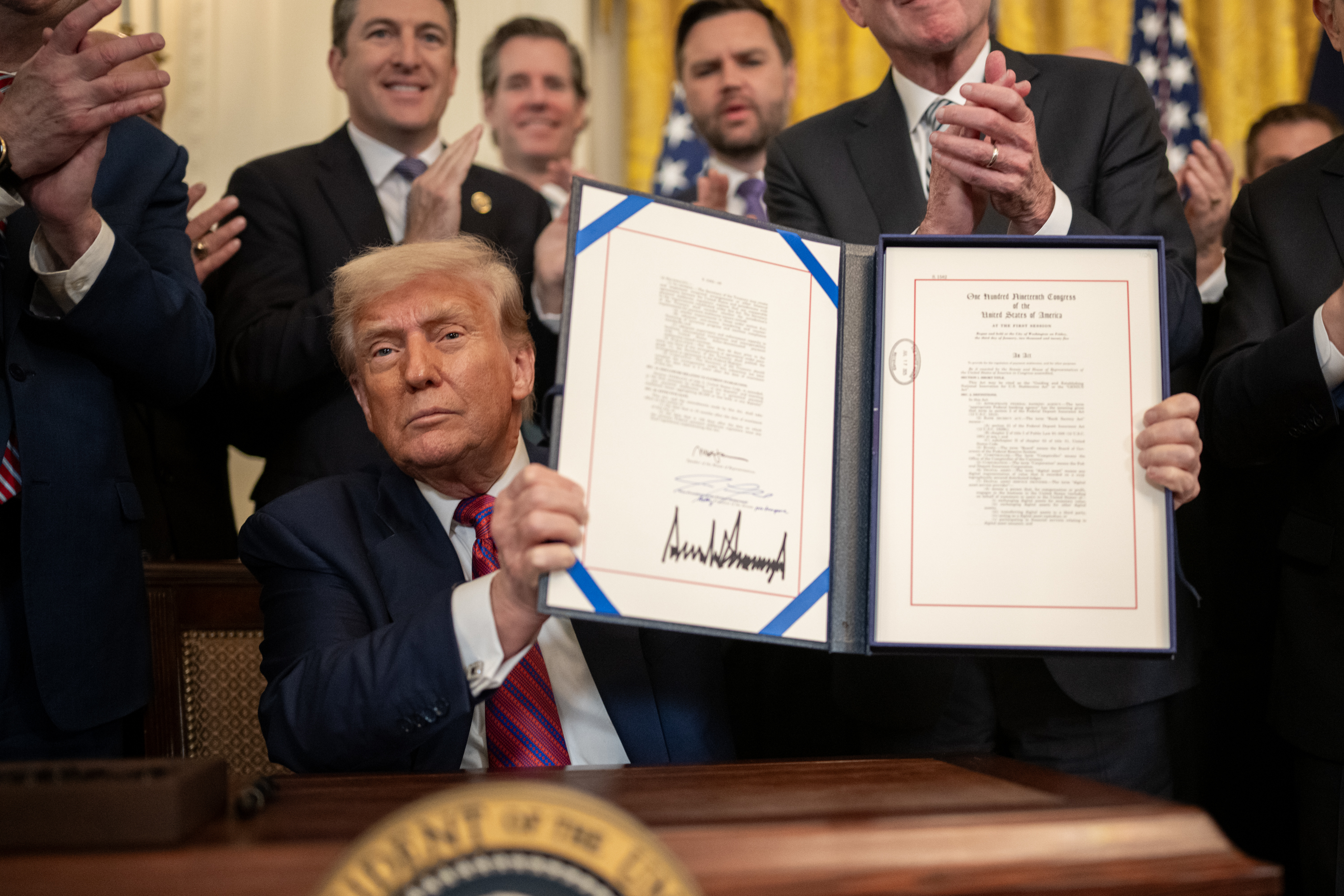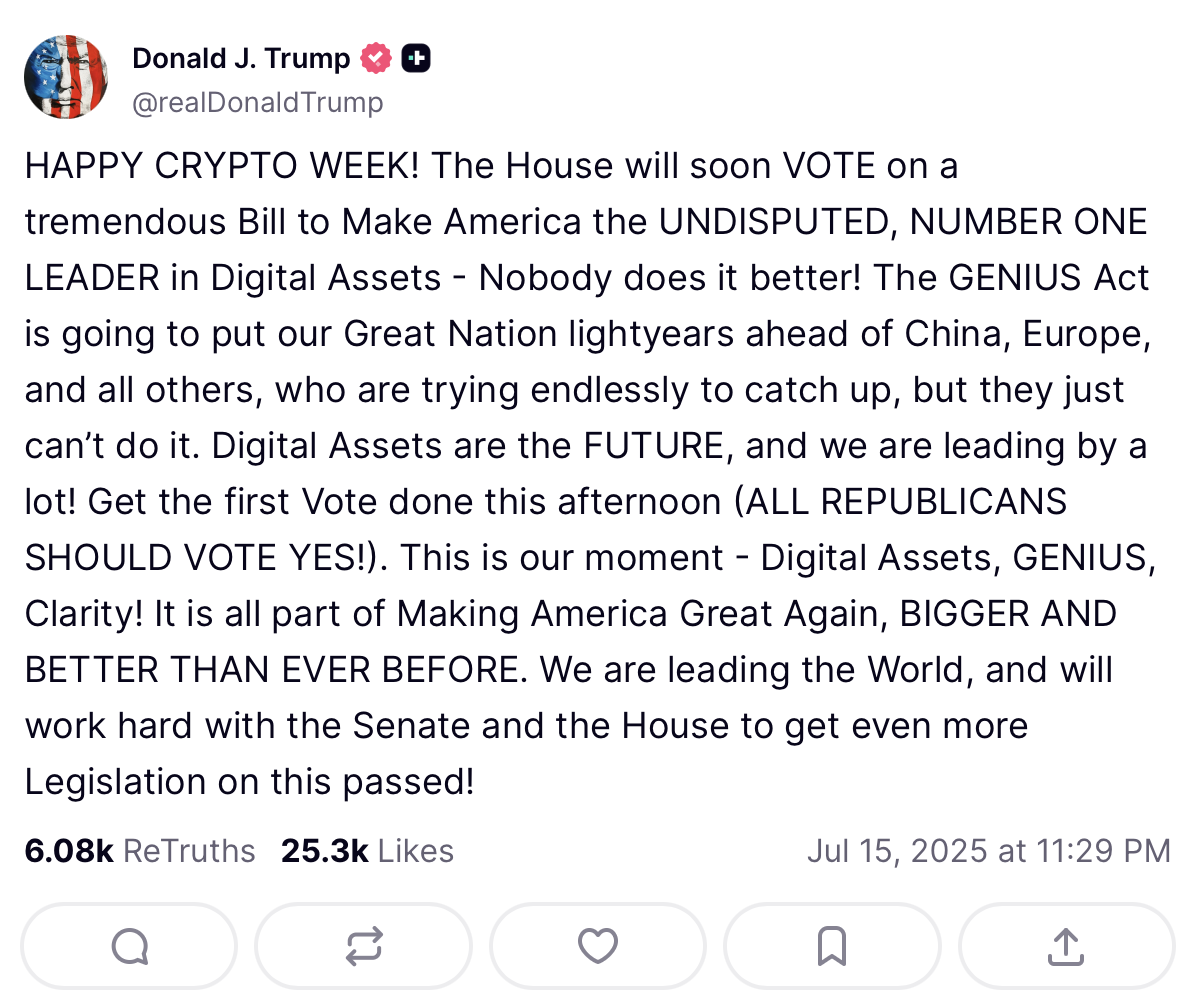Historic Moment: Trump Officially Signs the GENIUS Act
Original | Odaily Planet Daily (@OdailyChina)
Author|Azuma (@azuma_eth)

At early morning Beijing time on July 19, U.S. President Trump officially signed the much-anticipated GENIUS Act in the East Room of the White House. This not only means that the bill, which will have a profound impact on the development of the stablecoin industry, has completed all legislative processes and officially becomes a law awaiting effect; but also signifies that in modern history, the U.S. President has signed a law focusing on cryptocurrencies for the first time, opening a new chapter for the industry.
To commemorate this historic moment, the White House invited executives from several cryptocurrency industry companies including Robinhood, Tether, Gemini, and Multicoin to witness the signing of the GENIUS Act.
The 'Crypto Week' on Capitol Hill Begins,the House of Representatives will review three important cryptocurrency bills led by the Republican Party — the GENIUS Act, the CLARITY Act, and the Anti-CBDC Act.
On the eve of the review,Trump specifically posted on Truth Social to promote the passage of the three bills, stating that he would work with the House and Senate to push for more related legislation. However, the review process did not go as smoothly as everyone had hoped.

At early morning Beijing time on July 16, the review process officially began, but the first procedural vote (not the final vote, but a vote that must be passed to continue the voting) ended with a 196-223 failure. The main reason for the failure was that 12 conservative Republican representatives voted 'no', with some opposing members insisting that the three bills should be bundled together and advanced as a package.
Subsequently, although Trump claimed to have met with most of the representatives who voted against to persuade them to change their votes in the next procedural vote, the review process still reached a deadlock — Eleanor Terrett, a journalist who has long tracked various cryptocurrency policy dynamics, even repeatedly used terms such as 'chaos', 'still waiting', and 'don't know what will happen' to describe the situation at the time.
Finally,after 48 hours of internal negotiations, the review process restarted. Although there was significant uncertainty during the process (the Anti-CBDC Act even underwent a nearly 10-hour record marathon vote), the three bills were all passed in the early morning of July 18.
Among them,the most core GENIUS Act passed the House with 308 votes in favor and 122 against, and the vote saw a rare bipartisan consensus — over 100 Democrats defected to support this Senate-initiated bill, including House Minority Leader and New York Representative Hakeem Jeffries.
In addition,another highly anticipated CLARITY Act was passed with 294 votes in favor and 134 against, with 78 Democratic representatives voting in favor of this market structure bill aimed at establishing a regulatory framework for digital assets. Jeffries voted against this time, but key figures such as former Speaker Nancy Pelosi chose to support.
The Anti-CBDC Act was barely passed with 219 votes in favor and 210 against, with only two Democrats supporting this proposal to prohibit the Federal Reserve from issuing a digital currency.
Since the GENIUS Act had already passed the Senate, with the House vote passed, the bill will be directly submitted to the White House — as mentioned earlier, Trump did not wait a day and completed the signing the next day; the other two bills will be transferred to the Senate for the next round of review.
What Does the Signing of the GENIUS Act Mean for the Industry?
Regarding the GENIUS Act, the market has been warming up and promoting it for a long time, but many may not realize what this means for the market.
The full name of the GENIUS Act is the Guiding and Establishing National Innovation for US Stablecoins (GENIUS Act), which was jointly proposed by U.S. Senators Bill Hagerty, Tim Scott, Kirsten Gillibrand, and Cynthia Lummis on February 4 this year, aiming to establish a legal framework for the legal use of stablecoin payments in the United States.
The core provisions of the bill are as follows.
Definition of Payment Stablecoin: A digital asset pegged to a fixed monetary value, must be fully supported by USD or other highly liquid assets at a 1:1 ratio, specifically for payment and settlement scenarios.
Dual Licensing Regulation: Federal regulation, issuers with a market value exceeding $10 billion must accept federal regulation; state-level regulation, small issuers can choose state-level registration (must meet federal equivalent standards).
100% Reserve Requirement: Reserve assets are limited to cash, short-term U.S. Treasury bonds, or central bank deposits, and must be segregated from operating funds. Monthly submission of reserve sufficiency proof is required to ensure users can redeem at face value.
Mandatory Transparency Disclosure: Regularly disclose reserve composition and redemption policies, with compliance audits conducted by certified public accounting firms.
Anti-Money Laundering Compliance: Bring issuers under the jurisdiction of the Bank Secrecy Act, fulfilling AML obligations at the financial institution level.
Priority Protection for Users: In the event of issuer bankruptcy, stablecoin holders' claims take precedence over other claimants.
Clear Regulatory Jurisdiction: Clearly stipulate that payment stablecoins do not fall under the categories of securities, commodities, or investment companies, delineating regulatory boundaries.
From an industry impact perspective, the GENIUS Act, as the first federal-level stablecoin bill, has been widely regarded by the industry as a key step for stablecoins to move out of the wild growth stage, officially enter the compliance scope, and potentially move towards broader markets such as payments.
Symbolically, the GENIUS Act, as the first cryptocurrency bill signed by the U.S. President, will also become a milestone event for the compliance and popularization of cryptocurrencies, serving as the most powerful endorsement for the entire industry.
gave extremely high praise to the bill, calling it "will pave the way for the United States to lead the global digital currency revolution."
Trump also said to several industry representatives at the signing site: ""As I promised last year, the GENIUS Act creates a clear and simple regulatory framework for USD-backed stablecoins, unleashing the great potential of stablecoins.This may be the greatest revolution in financial technology since the birth of the internet. Many people are saying this."
And another statement from Trump might resonate more with every cryptocurrency practitioner — "I want to say that the entire cryptocurrency community has been mocked, ignored, and denied for years. Just a year and a half ago, you were considered insignificant, but this signing will be a huge recognition."
Times are changing, we are witnessing the gray areas of the industry fading away, and the road ahead will always be brighter.
